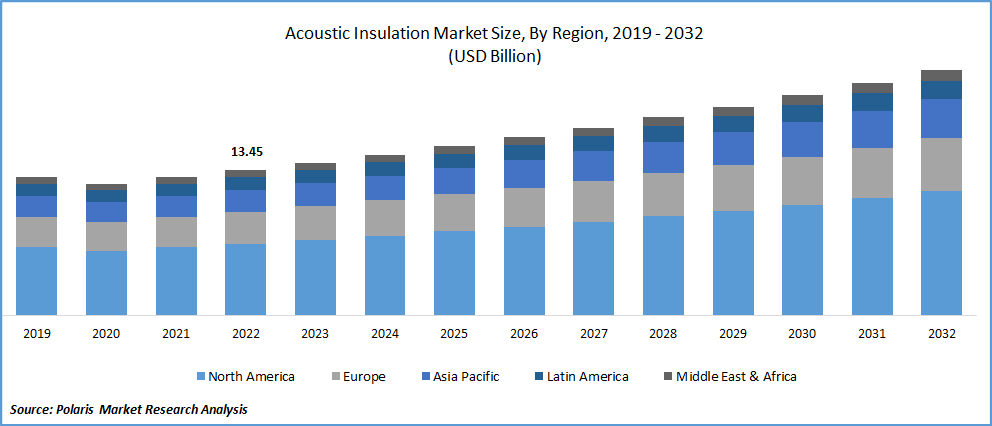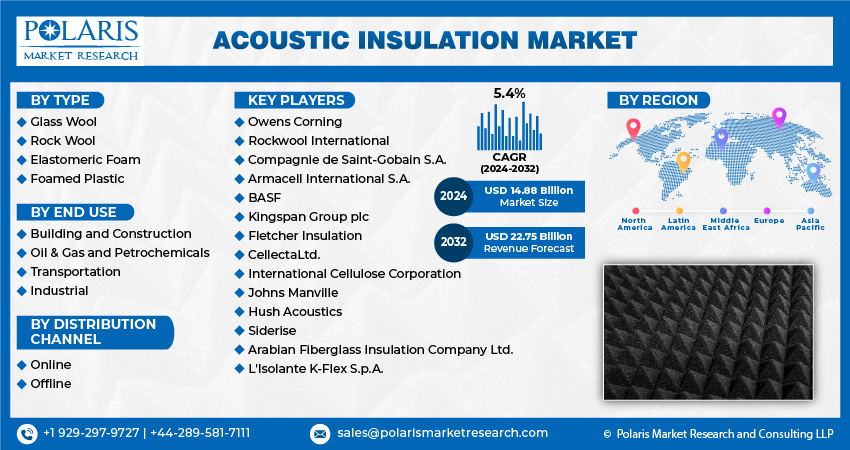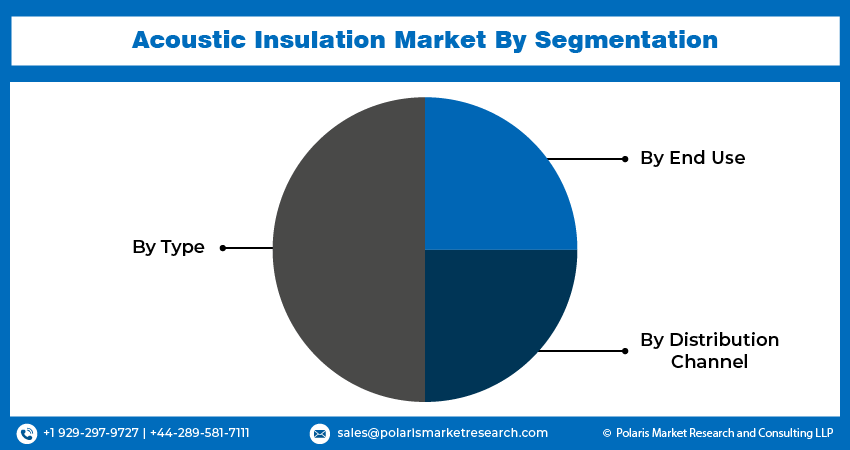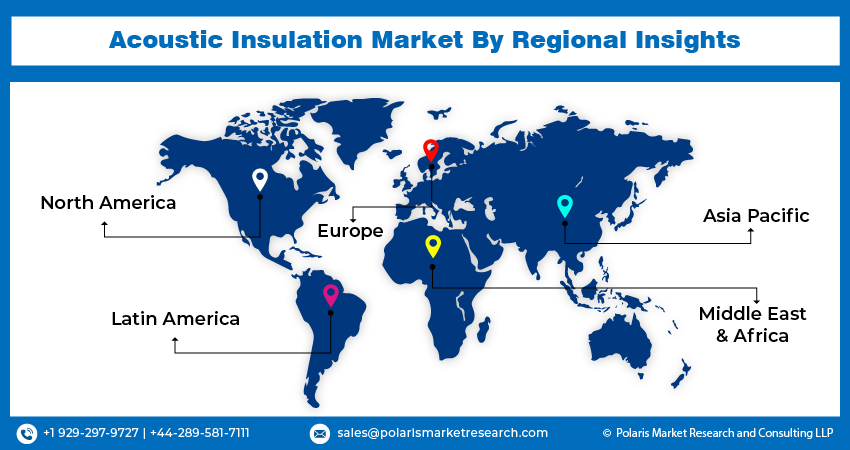
Acoustic Insulation Market Share, Size, Trends, Industry Analysis Report, By Type (Glass Wool, Rock Wool, Elastomeric Foam and Foamed Plastic); By End-use; By Distribution Channel; By Region; Segment Forecast, 2024 - 2032
- Published Date:Jan-2024
- Pages: 114
- Format: PDF
- Report ID: PM1156
- Base Year: 2023
- Historical Data: 2019-2022
Report Outlook
The global acoustic insulation market was valued at USD 14.15 billion in 2023 and is expected to grow at a CAGR of 5.4% during the forecast period.
Major factors influencing the growth and expansion of the worldwide market include the rising prevalence of urbanization, particularly in emerging nations like India, China, and Brazil, as well as the continually rising desire for and attractiveness of modern, smart houses with lavish interior designs. In addition, the booming building and construction sector and the quick rise in commercial buildings are driving up demand for acoustic insulation in upscale restaurants, resorts, and many other End uses, supporting the market's expansion.

Know more about this report: Request for sample pages
Acoustic Insulation is one of the recent technologies that is known for creating materials that absorb sound, reduce environmental noise levels, and are helpful for regulatory compliance. It is known for producing soundproofing and noise-reduction acoustic insulation materials. The acoustic Insulation market is anticipated to expand significantly owing to rapid industrialization and rising public awareness of noise pollution. Additionally, due to rising disposable income in developing countries, the market is anticipated to rise significantly over the course of the projected period.
Additionally, another aspect boosting market revenue development is the rise of health problems connected to noise pollution. As a result, issues associated with noise include stress-related illnesses, sleep disturbances, high blood pressure, speech difficulties, hearing impairment, and decreased productivity. For instance, several studies have established clear relationships between noise and health. The most common and often discussed health effect is noise-induced hearing loss (NIHL), however, studies have shown that noise exposure at regular or high levels can have several adverse health consequences. Thus, it is anticipated that rising health concerns connected to noise pollution would drive market revenue development.
Since people's attention was diverted from building development and excessive spending on non-essential items, including acoustic materials, the Covid-19 pandemic has had a detrimental effect on the acoustic insulation market and created an imbalance. The demand for different consumer-oriented items has steadily declined and the manufacturing facilities have become painful as a result of the lockdowns and limits imposed therein, which has eventually resulted in the extermination of the acoustic insulation market.

For Specific Research Requirements, Request for a Customized Report
Industry Dynamics
Growth Drivers
People have been impacted by noise pollution since the beginning of the industry in the late 18th century. Long-term noise exposure has been shown to have several severe health impacts, including sleep disruption, hearing loss, irritation, stress risks, adverse effects on the cardiovascular and metabolic systems, and cognitive impairment in children. Around 20% of people in Europe are exposed to long-term noise levels that are dangerous and unhealthy, according to the European Environment Agency (EEA). Additionally, according to recent statistics from the EEA, ambient noise causes 12,000 premature deaths and 48,000 new instances of ischemic heart disease each year. Additionally, 6.5 million individuals experience severe sleep disturbances, and 22 million people experience chronic high irritation.
Furtherly, A European Union (EU) document states that more than 30% of the population in EU nations is exposed to noise levels surpassing 55 dB(A) at night, 20% is exposed to levels exceeding 65 dB(A), and 40% is exposed to noise levels exceeding 55 dB(A) during the day. Governments in several nations are thus enforcing noise restriction laws to address this problem.
To lessen the negative impacts of noise pollution on employees, several industrial participants have expanded their use of acoustic-insulating materials like glass wool, rock wool, and foamed plastics. Regulations aimed at reducing noise pollution also raise the demand for acoustic insulation materials, which is expected to rise around the globe over the projected period.
Report Segmentation
The market is primarily segmented based on type, end use, distribution channel, and region.
|
By Type |
By End use |
By Distribution Channel |
By Region |
|
|
|
|
Know more about this report: Request for sample pages
Foamed Plastic Segment Accounted for the Highest Market Share
The market is dominated by foamed plastic. Due to its lightweight, vibration-dampening, heat- and sound-absorbing qualities, and ornamental and acoustic uses, such as interior ceilings of hotels, theatres, hospitals, and conference centers, it is suited for these settings. Due to their low price and good performance, these items are in more demand.
Due to the effectiveness of glass wool in minimizing sound transmission, the category is anticipated to see a significant revenue CAGR throughout the projected period. In automobiles, it offers a strong acoustic barrier and controls the amount of noise pollution to make driving enjoyable. It is considered as one of the market's most effective and environmentally responsible insulating materials. High thermal characteristics help clients save energy and lessen their impact on the environment. Acoustic attenuation is effectively provided by porous, elastic structures at operating temperatures up to 300°C.
The Building and Construction Segment Held the Significant Market Revenue Share
The building & construction category is anticipated to contribute the biggest revenue share. The development of acoustic insulation design is influenced by the introduction of cutting-edge construction technologies, the presence of various sound sources, such as contemporary high-decibel audio systems in homes, and growing awareness of noise pollution in society, which together are fueling the market growth. Increased noise pollution can harm a building's reputation with potential customers and raise complaints from current tenants in commercial buildings where customer happiness is a top priority. Additionally, acoustic insulation helps to lessen loud noise, improves privacy, and creates more comfortable surroundings, all of which contribute to a high market revenue share.
The Online Segment is Projected to Exhibit the Fastest Rate of Growth
Due to the quick development of different online shopping platforms, the rise in internet users, the accessibility of fast internet, and shifting consumer preferences toward online distribution channels due to their numerous benefits including free home delivery, a single location for many worldwide brands, and simple payment options, it is expected that the online market would expand at a rapid CAGR in the years to come.

Asia Pacific Dominated the Global Market in 2022
The largest market share for acoustic insulation has been held by the Asia-Pacific area, where essential factors influencing the industry's growth are being established. The native population also appears to be fairly interested in new product improvements. The region's construction industry is being strengthened by an increase in infrastructure projects brought on by the swift economic development of nations like China and India.
Additionally, governments in emerging economies are pushing for the adoption of minimum insulation standards to enhance the condition of buildings, which is driving the product's growth in the area.
However, The European region is also expanding steadily, and there, the focus of the acoustic market has switched from commercial to automotive, defense, and space projects. The aerospace and defense sectors in this region are also seeing a need for acoustic materials.

Competitive Insight
Some of the major players operating in the global market include Owens Corning, Rockwool International, Compagnie de Saint-Gobain S.A., Armacell International S.A., BASF, Kingspan Group plc, Fletcher Insulation, CellectaLtd., International Cellulose Corporation, Johns Manville, Hush Acoustics, Siderise, Arabian Fiberglass Insulation Company Ltd., and L'Isolante K-Flex S.p.A.
Recent Developments
- In June 2019, Knauf Insulation introduced the Acoustic Batt, a brand-new product that has been specifically created for the South African market to dramatically reduce noise. High-performance mineral wool known as "Acoustic Batt" is used in room floors and partition walls to dampen noise.
- In August 2020, ArmaGel DT was released by Armacell. Customers across the world may get high-quality thermal and acoustic solutions from ArmaGel products.
Acoustic Insulation Market Report Scope
|
Report Attributes |
Details |
|
The market size value in 2024 |
USD 14.88 billion |
|
The revenue forecast in 2032 |
USD 22.75 billion |
|
CAGR |
5.4% from 2024 – 2032 |
|
Base year |
2024 |
|
Historical data |
2019 – 2022 |
|
Forecast period |
2024 – 2032 |
|
Quantitative units |
Revenue in USD billion and CAGR from 2024 to 2032 |
|
Segments Covered |
By Type, By End-use, By Distribution Channel, By Region |
|
Regional scope |
North America, Europe, Asia Pacific, Latin America, Middle East & Africa |
|
Key Companies |
Owens Corning, Rockwool International, Compagnie de Saint-Gobain S.A., Armacell International S.A., BASF, Kingspan Group plc, Fletcher Insulation, CellectaLtd., International Cellulose Corporation, Johns Manville, Hush Acoustics, Siderise, Arabian Fiberglass Insulation Company Ltd., and L'Isolante K-Flex S.p.A. |
FAQ's
Acoustic Insulation Market Size Worth $22.75 Billion By 2032.
key players are Owens Corning, Rockwool International, Compagnie de Saint-Gobain S.A., Armacell International S.A., BASF, Kingspan Group plc, Fletcher Insulation, CellectaLtd., International Cellulose Corporation, Johns Manville.
Asia Pacific contribute notably towards the global acoustic insulation market.
The global acoustic insulation market expected to grow at a CAGR of 5.4% during the forecast period.
key segments are type, End use, distribution channel, and region.
